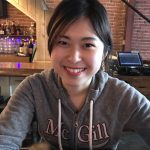Hometown in Japan: Kyoto
Home University: Kyoto University, Faculty of Science, Biology
B3: Junior, Expected Graduation Date: March 2020
Host Lab at Rice University: Subramanian Lab
Host Professor: Prof. Devika Subramanian, Depts. of Computer Science and Electrical & Computer Engineering
Recipient: 2nd Place Poster Presentation Award at Joint RCQM-Nakatani RIES Research Symposium
Why Nakatani RIES?
What I am attracted the most about this program is that I can gain a hands-on research experience in one of the top universities in the U.S. I consider it very rare for a student in Japan, where we have a different language and systems, to be able to work in a lab in the U.S. The duration of the program, 5 weeks, seems to be long enough to settle down and focus on the project and also to fully grasp the atmosphere of labs in the U.S. I want to take advantage of this chance and build a foundation for my future.
Another thing that I am seeking through this program is the improvement of my English ability. I have recently realized that English skills in academia are not the same as English used in daily conversations. In this program, I would like to use English to actively communicate with professors and other members in my host lab.
- Absorb as much knowledge and technique as possible: By joining a lab, I hope to learn about cutting-edge knowledge and techniques used in research.
- Improve my academic English ability: In the long run, I would like to be able to construct and evaluate logic, understand abstract concepts, and read papers more quickly in English. I hope this program will help me make a leap forward with this goal.
- Stop being hesitant: I tend to be insecure about my knowledge and am hesitant to ask questions. I hope it can become more comfortable and natural for me to let people know when I don’t understand things and ask for help.
Meaning of Nakatani RIES: Post-Program
By participating in this program, I have learned to strive for my goals outside my comfort zone. This program sets several concrete goals for the participants and also, since I have written some essays during the application, I had developed my own personal goals as well. Having these concrete objectives made my stay in the U.S. much more challenging and valuable. Conducting something outside of what you are normally used to requires a lot of courage and knowledge to support you through the uncertainties that you will face. For example, interviewing professors always made me nervous, but I tried to prepare myself as much as possible beforehand. Going through all the adventures in the U.S. definitely made me stronger and more motivated to challenge myself.
In the age of globalization, I think there is so little you can do within where you grew up in, but so much you can achieve once stepping out of your comfort zone. I think experiencing how work is done in the U.S. will inspire you how you want to form your lifestyle. There are aspects that match your personality and those you are not comfortable with. I have been contemplating a lot on how I want to balance the pros and cons of living in a certain country. Overall, I believe having a broader and deeper perspective will give you helpful insights when you have life-decisions to make.
- My favorite experience in the U.S. was… meeting people and eating Tex-Mex!
- Before I left for U.S. I wish I had… prepared more for my project.
- While I was in the U.S. I wish I had… reached out to more people to talk about their careers.
Excerpts from Mari’s Weekly Reports
- Week 01: Arrival in the U.S.
- Week 02: First Week in My Research Lab at Rice
- Week 03: Interview with U.S. Student and Researcher
- Week 04: Reflections on English Language & Life in the U.S.
- Week 05: Final Week at Rice and Research in the U.S. vs. Research in Japan
- Research Project Overview and Poster
- Week 06: Last Week in the U.S.
- Final Report
- Tips for Future Participants
Week 01: Arrival in the U.S.
To be honest, I did not prepare so much prior to my arrival in terms of my daily life in the U.S. I searched on the Internet about what the weather was going to be like, so that I knew what kind of clothes that I needed to bring. It was also helpful that last year’s participants gave us a talk on what it was like living here, because I brought a jacket that I now wear every single day at the office. I wouldn’t have been able to survive without this jacket, for the rooms are terribly cold in Rice University due to the heavy indoor air conditioning.
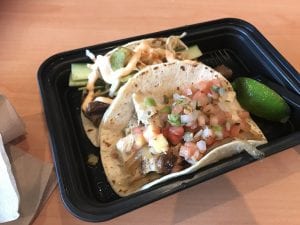
My initial reaction to Houston was it is “huge.” While taking the Rice University shuttle from the airport, I couldn’t help but open my eyes in astonishment. First, the width of the freeway almost made me laugh. The number of lanes for 2 ways in Japan is the same number of lanes for just one way in Houston. My question is whether it is easier to drive in Japan or in Houston. I guess that it is nice that you don’t have to be cautious of narrow roads but you have to be careful for other cars changing lanes.
The day that I arrived at Rice University had a great impact on me. I was amazed by how well maintained everything was on campus. All the orientation lectures were interesting and informative, especially Prof. Kono’s, since it is a rare occasion to have a professor in the U.S. talk to you about the reality of a career as a researcher. I wished that I had listened to Sarah’s lecture on life in the U.S. before my exchange program in Canada. Still, it will be helpful for my future adventures abroad. I also enjoyed the campus tour because it gave me a lot of information about the history of Rice University. Finally, Dr. Moran’s lecture on poster design was very beneficial, and now I look forward to creating a poster.
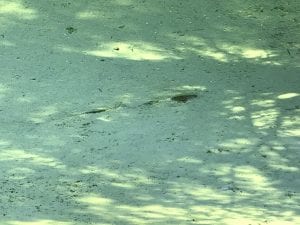
The activities were a refreshing change of pace for me. When I am working with my mentor, I can get somewhat nervous and overwhelmed. However, the orientation activities enable me to enjoy myself from the bottom of my heart. Also, it was a good opportunity to interact with the other Japaense participants. The Houston Mural Tour was the most interesting to me, because I do not see such colorful street art in my hometown. Since this is a new and growing culture, I believe that Houston is going to become more and more colorful from now on. Another fun experience was going to Brazos Bends State Park with Ogawa-san to see the alligators. Though we only saw two, I was astonished by the abundant nature in the park, and I envy the natural resources that the U.S.A. has.
- There are actually many state parks in each of the 50 states plus national parks in the U.S. Usually, you just pay a small admission fee per car to enter and then can enjoy lots of nature. You can also rent camping sites and some have hotels if you want to stay longer. No matter what state you go to in the U.S., just Google the name of the state + state park and you will find out more on what is nearby. You do need a car to get to almost all state/national parks though as they are typically located outside of urban areas.
- Texas State Parks Service
- State Parks Near Houston (TX State Park Service)
- 10 Best State and National Parks in Texas (Guardian)
- U.S. National Park Service
- 59 U.S. National Parks by Popularity (Crazy Tourist)
Reflections on Intercultural Experiences
I believe there are a lot of trivial things that accumulate and create differences between the U.S. and Japanese culture. Here, I will refer to two explicit aspects that I feel are different from Japan, Capitalism and Equality. As elementary school students, we learn that the U.S. is a big capitalist country. From what I read and see, I agree. Capitalism seems to have enabled a lot of talented people to realize their dreams in the U.S. On the other hand, I recognized the downside of capitalism. When I was taking an Uber to downtown, I saw many people who are homeless on the streets. Indeed, there are people who are homeless in Japan too, but the number seems to be different. I assume that the safety net for these people is not as well provided as in Japan. It scares me to think what I would be doing if I failed to be successful in the U.S. Also, I felt that these homeless people are functioning as a warning to those who are chasing their dreams.
This also raises a question of equality. The U.S. is known to be a country where they value “equality” very heavily. There is a lot of news that broadcasts the movements for gender equality, racial equality, and so on. America is a country where people are sensitive to discrimination. This “equality,” however, seems to be something against “discrimination” but nothing more or less than this. In Japan, there is a phrase “the right to maintain the minimum standards of wholesome and cultured living” in our constitution. This results in the safety net, mainly financial aids, provided to people who are in need in Japan. So what I think Japanese consider as “equal” is the fact that everybody can have a stable foundation for their own lives. The difference that I feel is that while Americans want to equalize the opportunities they can obtain regardless of their situation, Japanese tend to focus that people can build the foundation for their lives before talking about opportunities.
- For more on this, see the following sections on our Life in the U.S. page:
- Discrimination and Inequality in the U.S.
- Social Issues in the U.S.: Homelessness
- Social Issues in Japan: Homelessness
I tend to be eager to avoid displeasing people, and I believe this is partially due to the Japanese spirit of Wa/Harmony. Although this might results in dishonesty, I do not think this is a bad thing. Of course, suppressing my own opinion is not a bad thing, but there should always be a compromise when two opposing opinions exist. If people were to live abroad, I believe this is a quality that can be strength for Japanese people. We can be someone who helps smooth over the conversation and discussion. The only thing to note is that we need to set up some limits to this too. Pleasing people should not our only role in conversations. We can take advantage of the spirit of Wa/Harmony, and cleverly detect when is a good time to say what.
Preparing for Research and First Few Days in the Lab
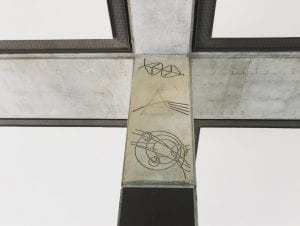
Many of the buildings in Rice University seem to have some kind of elaborate decoration. ~ Mari Shishikura
In terms of research, I did a few things to prepare before I arrived in Houston. First, I had a Skype meeting with my professor. I found this very helpful because my professor told me what I needed to prepare, taking into account what knowledge I already had. Also, I contacted an alumnus and asked what I should be expecting. She suggested a Japanese book to read, which made my learning faster. It was very nice to have a vision of what I was going to be doing.
Even so, I only had a week to prepare since I had my finals back in Japan. What I would suggest to future students is to start early. Even if studying a cutting-edge field feels overwhelming, it is important to keep in mind that it derives from a basic knowledge. Looking into those basic level things is something one can do somewhat more easily, but this can also greatly enhance your speed of learning as you begin to work in the lab.
My experience in the lab so far has been good. It is my first time doing computational research and I actually like this style of this research. The flexibility is something that I appreciate. For example, I can do my research from my laptop wherever I want to after I finish discussing what to do with my mentor. Another, is that I could wear any clothes I like. When I was in a biology lab back in Japan, I was not able to wear sandals or skirts.
Since my background is not computer science, it takes a lot of time to get things done. At the moment, I am learning how to deal with big data using python. I realize that this is the most basic step and I wish I had prepared myself a little more so that I could have jumped right into research. Also, it is a little frustrating when I feel like I understand what I am supposed to do while talking with my mentor, but then am not able to accomplish it on my own. At those times, I try to take a walk on campus and relax myself. Overall, I am having a wonderful time with my mentor since he is very kind and patient.
Week 02: First Week in My Research Lab at Rice
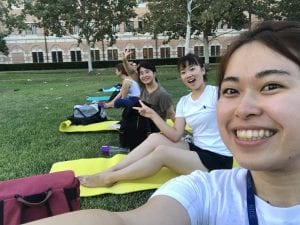
My second week in the lab was a little irregular, because my mentor, who is a post-doc, went back to his hometown on Tuesday and has been away since then. However, my project did not stagnate, since I could contact him via email and he could give me instructions online as well. I felt this was another type of exposure to the field of computer science.
My professor’s lab seems to be a small one, for I have only met another new member this week. However, she told me that she has other projects and collaborative research projects in her lab. To define a lab as a physical place might not have a significant meaning in the field of computational research, instead a research project might define the unit better. Another thing that surprised me is how researchers are assigned to a room. My professor has her individual room, and my post-doc usually stays in another room that he shares with two other researchers from different labs. This style is very different from what I know of in Japan, where members of the same lab stay in the same area.
In terms of communication, I have not experienced any major issues so far. One of the reasons is because my mentor and I communicate via email. When we have discussion, I ask a lot of questions because I am slow at understanding. I am very grateful that my mentor is very patient and always makes sure that I understand.
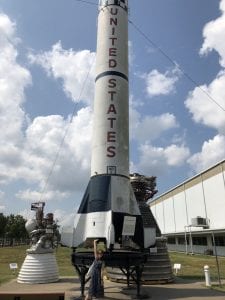
The seminars this week were all helpful because it allowed me to have a clearer image of what doing a Ph.D. in the U.S. is like, and what to do to prepare for it. Asking questions to current Ph.D. students in the U.S. is definitely not something we can do in Japan, and I am happy that I had this opportunity. Lunch with Professor Matsuda had a very big impact on me too. There are so many things he said that stuck in my mind, especially about productivity. Everyone has 168 hours a week and it is hard to work more than a certain number of hours with high efficiency. How you gain productivity is to pursue several things at a time if possible. This answered the question I was asking myself for a while: Should I focus on one thing even though I have so many things I want to do? In Japan, I go to a lab almost every day after class and get home at around 10:00PM. Although this takes up a lot of my time, I have a lot of other projects I wanted to start. I was always considering which one to choose, but after this seminar, I have made up my mind to give it a try and pursue them all.
The excursion to NASA was so much fun and I learned a lot while reading through all the explanations. Even though I did not have a strong interest in space, looking at how people work hard and create such elaborate objects moved me. It made me want to become resilient and persistent just like the people who has worked at the space center. This week, my roommates and I went to sunset Yoga at Rice University and summer tango at Discovery Green Park in Downtown Houston. It was to good exercise after a long day in the lab. Another interesting thing was to attend my professor’s class. Sahil had told me that he valued the fact that the class sizes at Rice University are small, and I am happy that I could experience it.
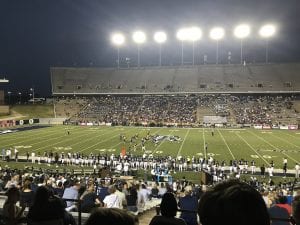
On Saturday night, I went to watch a football game. It was just watching the game, but I had so much fun and enjoyed it a lot. First, the game was enjoyed by a variety of people regardless of gender or race. Second, it made me realize how small Rice University is. The marching band of the opposing team was very big and it was overwhelming.
Research Project Update
As mentioned in the first week weekly report, I am working on computational biomedicine. What I do is to use a computer-program, python, and analyze the data provided from Texas Children’s Hospital regrading to a disease called DKA. What I am trying to do is to find a pattern in the dataset and build up a model to detect the reoccurrence of this disease.
For training, I looked through the codes that my professor had already written and familiarized myself with methods like pandas and dataframe structures.
During my second week, I started to actually use the dataset and extract the data we are going to use. Also, I cleaned the data to exclude un-useful data. I am very happy that I am starting to use the actual data because we focused on practicing last week. Probably for the coming weeks, we will apply models and adjust it so that we can have a good prediction model.
Week 03: Interview with a U.S. Student and Researcher
I interviewed Prof. Aazhang, who is a professor in the Department of Electrical and Computer Engineering and former Chair of the department. I have wanted to talk to him because he is in a field called “Neuro-engineering,” which interested me very much as a student fascinated by neuroscience.
“Neuro-engineering,” which is a phrase that I was not so familiar with, refers to a field where engineers are trying to understand the brain, which in turn assists researchers in medicine. The people engaged in this field try to use tools in engineering, such as electrical devices and data science, to cope with this very complex organ. (Rice University just launched a new Neuroengineering Initiative and Center; a $49.5 million investment.)
Prof. Aazhang has been working on “Neuroengineering” for seven years now. Before this, he was focusing on wireless networks. He learned about this field, which was not very developed at that time, and thought that he could be engaged in it and get something beneficial. I asked whether he had a passion for neuroscience at that time, and he seems to have been more interested in what he can do with his work, rather than what brain actually is. He said, “I always wanted to be an engineer, not a scientist.” I believe this shows his perspective of his work, and I was surprised how clear his vision is.
His lab focuses on theoretical research about neuroscience. I asked what he thinks about the gap between theoretical understanding and actual biological facts. He told me that he thinks this gap is actually where engineering takes a part in. To create an interface is the job for engineers and this will connect the two different fields. This answer struck me very much and attracted me to neuroengineering.
I have a background in biology, but I have been feeling that biology has a limitations in answering the questions I have had since high school. This made me interested in the field of theoretical/computational neuroscience. When I told him how I am interested in studying for theoretical neuroscience, he said I was doing fine. Interestingly, he emphasized that I should keep the balance of the two, and sticking to either side is too narrow. His advice to me was to stay open. I believe this was the key to his success.
Another question I asked was, whether he thinks the U.S. has an advantage over other countries in terms of doing research. He believes that the U.S. has better quality and quantity than many countries, but there is always a healthy competition among countries. That being said, he recommended that I do a Ph.D. in the U.S. He told me that he also suggests his American students go abroad and put themselves in a different environment. His idea is that doing something different benefits that person.
I think a lot of people who have suggested that I do a Ph.D. always emphasized that the U.S. has a better environment to pursue a Ph.D. However, Prof. Aazhang’s opinion was a little different. This left a great impact on me and actually became a very convincing reason for me to come back here. In the end, I asked for a piece of advice he would have for young students. It was “Study and learn a lot; especially mathematics and physics. Try to do research and stay engaged.” This will definitely be my guide when I go back to Japan.
Talking to Prof. Aazhang was one of the highlights I had this week. This is because I had looked through his work via his lab’s website so many times when I had to decide which laboratory to apply for. I tried to be fully prepared for the interview so that I could ask all the questions I had, but also tried to absorb what he was saying simultaneously to ask deeper questions. I am very satisfied with the interview I had with him.
Interview with a Student
I also had an interview with Julio, who is a senior undergraduate student majoring in mechanical engineering. I got to know him in the Japanese lunch table organized by Professor Ozaki. I am grateful for this opportunity that let me become friends with him.
He chose to study mechanical engineering because he has been interested in cars. He says that his father, who owns a car repair shop, and his brother, who is also a mechanic, have had a big influence as he grew up. The biggest reason that he chose Rice University as his school was because the university provided him with full scholarship. Another reason is that he wanted to stay in the southern part of the U.S. since he grew up in Florida and his family is there.
My next question was, what he thinks is special about Rice University. He mentioned the fact that the class size is smaller and more intimate. This was interesting for me because Sahil had said the same thing and also because I prefer a larger class. Another thing is that students are highly motivated and independent. For example, in some engineering club activities, students are engaged and take the initiative. He considers this to be different from some universities where professors lead the student clubs.
His current plan is to graduate from university and go to a company to work as a mechanical designer. He has no intention to go to graduate school at this point, unless his company financially sponsors him to get a Master or Ph.D. degree in the future. Interestingly, though he wants to work in a company related to mechanics, he would not decline an offer to work in a management position. He has actually done an internship in a mechanics company over this summer and was assigned to a management position. This experience seems to have convinced him to stay open to other positions than something in mind.
I asked what he was proud of about the U.S. His answer is that people can come from all over the world and chase their dreams. This has a great meaning for him and his family. His father was an immigrant from Cuba, and when he arrived, he was starving and had to start his life from scratch. The U.S. allowed him to do so, and Julio is proud of his father. A lot is going on in American politics but I hope the U.S. could keep Julian proud. Another aspect that he pointed out was, people can be proud of their abilities.
On the other hand, I asked what he thinks the U.S. should improve. His answer was that “If one is too proud of himself and does not listen to others’ opinions.” He argues that this leads to the current problem in the U.S. where people are ignorant of others. He believes that if one cares for another, there is a solution to social problems, such as health insurance.
The U.S. being such a large country, I questioned where he wants to live in the future and what quality he is looking for. He answers that he wants to live in Florida because his family is there. His motto is to “Be around people that make you happy.” For him, this is his family.
Finally, I asked what he knows about Japan excluding anime and manga, which caused him to study Japanese. He told me that he heard about the bad working environment. Also, he has heard of the Japanese culture to “drink with bosses,” which he would not like to experience, because he believes this action is actually overtime work since he would not be able to enjoy drinking.
I am grateful that I made friends with him and was able to talk to him. This program emphasizes greatly on going abroad and interacting with people from different cultures. However, his mindset is very down to earth. That is, he wants to stay where people make him happy. I felt that I might be always looking outside for happiness. Maybe I should keep in mind to cherish what I have around myself.
Research Project Update
The third week in my lab was a little bit hard because there was a newer data to analyze. I basically had to start it all over from scratch. It was a little bit of a pity that I had to pause what I was originally doing and go back again, but I think it was a good practice.
The newer data seems to be lacking some data. My mentor told me that Prof. Subramanian would be going to the hospital to check if all the data was given. It is very interesting because I first thought that my code was lacking precision, but I realized that the fault might be in the data itself, or even in the procedures done in the hospital. Of course, my job is to make my part perfect, but I should always keep in mind to look at the bigger picture.
Other Activities this Week

We saw a baseball match ~ Mari Shishikura
All the lectures this week were very appealing, but the talk by Prof. Akane Sano in the Department of Electrical & Computer Engineering on Monday had a big impact. I could sense her passion for what she is doing, and I could easily imagine that her enthusiasm for the field has been the key for her successful career. She looks very young for her position and her liveliness was very enchanting. That day after the lecture, I kept on hoping that I could keep the liveliness and enthusiasm just like her.
Another memorable experience was the baseball game. Like the American football game, immersing myself into the cheering and the noise in the stadium let me feel like I am a part of the society here. Also, I am happy that I got to see Shohei Ohtani, of course. However, it was a little overwhelming to think that he is only three years older than me but already so successful. I cannot imagine how much pressure he has but he is indeed our pride. I couldn’t help but wonder what lies ahead of me that might makes people proud.
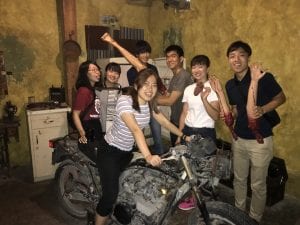
On Monday, I went to an Escape room game with other members. This is where we are locked in a room and have to seek clues to get out. It was very fun because I got to cooperate with my friends who are from best universities in Japan. It was just a game, but I enjoyed seeing how everyone found their role and worked together to escape. I took advantage of the long holiday weekend for Labor Day to visit San Antonio. People in Houston were kind, but people in San Antonio were even more kind. The bus drivers were the best bus drivers I have ever encountered and they gave me many suggestions for restaurants to visit. I felt that San Antonio is small but historically and culturally rich. The architecture and the scenery seem to differentiate it from other cities. It was the best location for some time off from research.
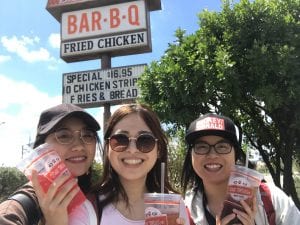
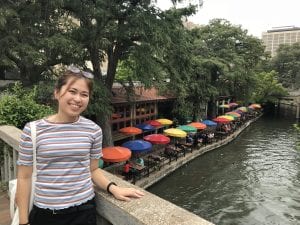
Week 04: Reflections on English Language & Life in the U.S.
Having small talk in English has become something I am fond of in Houston. I have said it so many times, but I was very surprised by the small-talk culture here. However, I have realized how heartwarming it is, and now, I sometimes start a conversation on the elevator at the hotel. One memorable time was when I greeted a woman while I was waiting for the elevator. It turned out that she was heading to the hospital because her first grandchild had just been born. I could see that she was happy and I was also very happy that I got to share the wonderful news with her.
I feel I consume more energy when I speak in English about my research with my mentor. This is because I need to understand the content and the language itself. Explaining my opinion or what I have discovered is sometimes challenging because I am used to doing this more in Japanese. However, to practice this is one of the reasons I decided to participate in this program. Though it is sometimes hard, I usually have a positive mindset that this is an opportunity for me to practice. Especially in research, when I feel like I don’t understand well, I try to put it into my own words and confirm if my understanding is correct. So I often say things like, “So my understanding is that so-and-so, is this correct? Or did I misunderstand?” This not only makes sure that my mentor and I are on the same page but also help me digest the context.
Another difficulty I sometimes face is when I try to talk among native English speakers. It is often said that it is actually easier to talk with non-native English speaker than to talk to native speakers, and I agree with this. The speed of the conversation is faster, they use many idioms and they make a lot of jokes. These are hard to keep up with. My professor and my mentor are both native English speaker and I often struggle to join their casual conversations. Of course, I can respond to questions but I am sometimes itching to make puns since I come from Kansai area, where we cherish the “omoroi (funny)” culture.
What I try to do to improve my academic English is to listen to Podcasts daily. I like listening to the “Science” podcast. This is very helpful because it is broadcast in conversational style. The program host will listen to scientists’ talk and ask questions. From this, I learn what questions to ask, how to ask those questions, and how to comment on the talk. Of course, I can gain scientific knowledge along the way.
In order to improve my daily conversation, I also eavesdrop very often. What do students say when they want to have a casual conversation while waiting for their food? How does one start a conversation in the elevator? What does one say to another when they meet each other 5 times a day unintentionally? I will listen carefully and try to steal their phrases. I believe this is one way to obtain natural and casual responses.
So I must say, when I have my earphones on but am not dancing, chances are, I am listening to podcasts or listening to your conversation pretending that I am not.
Research Project Update
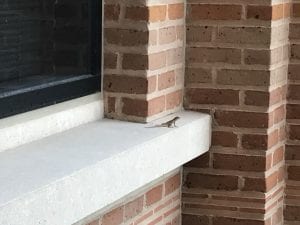
This week, we have started to get the final data. The process of getting the final data made me nervous because it is the moment when my three weeks of work pays off. I had to struggle a little to get what I wanted, but I was finally able to get some “good” numbers, which indicates that my model is useful. This made me happy and my mentor praised me for my work.
My mentor seemed to be happy with my work, but he also gave me a very informative talk. He said, “Someone can code, but this doesn’t mean that he is a good scientist. You shouldn’t only look at the numbers. You need to think. If your number indicates that your model is good, watch out for pitfalls that made it look that the model is good. If your number indicates your model is bad, think what is lacking and what can or cannot be improved. This makes a good scientist.” I was struck by these words. At that point, I was only paying attention to whether the number, which represents the efficiency, was good or not. However, I realized that my project actually has so many patients behind the numbers. What I have is not ideal and beautiful data, but rather full of the errors and imperfections that humans create. I think good data scientists are those who can see beyond the data provided.
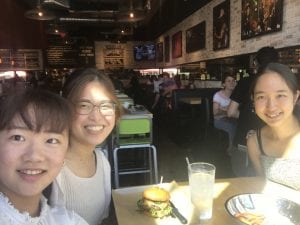
Also, considering what is behind the numbers turned out to be even more exciting than just coding itself. I currently hope to be a “thinker” in the future and in that sense, I think scientist is more suitable, rather than engineer.
Daily Life in Houston
As usual, I am grateful for the lectures and I especially enjoyed the one by Jennifer. Topp from Lehigh University. I was surprised that she mentioned a lot about business cards because I thought they are mainly prevalent in Japan. I could also feel that she loves her work, and I think it is wonderful that women can pursue their careers and be confident about their positions in the U.S. In general, I think women in the U.S. are livelier than those in Japan. I hope to work in this kind of environment too.

On Wednesday, I went to a Zumba class at the recreation center. It was nice to move my body after sitting in front of my computer all day. On Saturday, I went grocery shopping with Natsumi-san and Yui. It was interesting to see what she buys as a Ph.D. student living alone. After that, she took us to a restaurant to have lunch. She insisted on paying extra for us because she is a “sempai” after all. I found it very funny that she suddenly brings this Japanese culture even though she seems to be very Americanized and we were eating hamburgers, which is very American. I am very satisfied because I was able to ask her about the Ph.D. application process.
Week 05: Final Week at Rice and Research in the U.S. vs. Research in Japan
As I finished up my last days in the lab at Rice University, I would like to make an overall comparison among the three labs that I have belonged to so far. One is a lab at McGill University in Canada. There, the professor was a Japanese woman who had obtained a Ph.D. from Baylors College and who then did her postdoc in the U.S. The second is my lab back at Kyoto University where I have been working since this spring. The third one would be, of course, this lab at Rice University, Prof. Subramanian’s lab. To be honest, I think it is very hard to compare the three because the research areas are all different from one another, but I would like to write down the overall characteristics.
The lab at Rice University was the most individualistic. I believe this is very plausible since it was a computational research lab where everyone should be facing his/her own computer most of the time. I would spend a typical day alone, facing the computer for 9 to 10 hours in the lab, or even at my hotel, and maybe would talk to my mentor for an hour or two. This style unfortunately did not provide me with many chances to interact with others. However, I personally liked this style very much since I tend to want my own space when I focus on something. Also, since I did not feel the stress from being monitored, I could make interesting detours in learning. For example, I had to use a method called the Random Forest Classifier. First I would look up what it is and how to code. While doing so, I encountered a concept called a “decision tree”. Then, I would investigate what a decision tree is until I was satisfied to go back to understanding Random Forest. I enjoyed this flexibility. After all, not spending time with each other does not mean that we are ignorant of one another. I felt that my mentor and professor cared for me very much.
On the contrary is the lab at Kyoto University. Here, I do some biological and molecular research. I would rather say I am a part of the workforce than a researcher there. That is, I would not consider the problem so frequently, but rather learn the question and the strategy my mentors are thinking, and conduct the experiments as they tell me. They educate me and train me well. However, “No contamination. Comply with the protocol.” is the main thing on my mind when I am at the lab, which is not always satisfying. Also, there is a lot of limitations to what I am allowed to do, which makes it hard for me to become independent.
The lab I joined at McGill University is situated in between where I had independence but a lot of interaction between my labmates. It was also a small lab with only 2 graduate students, but that enabled them to keep track of what I am up to. It became easy to have casual conversations since the professor hosted a Christmas party at her house. The project that I did in this lab was something I proposed so I did not have a mentor, but I would talk to my professor about the progress or problems approximately twice a week. This was very comfortable because I was independent but had enough support. However, the project was demanding since I was dealing with drosophila, which meant that I have to live along their life cycle.
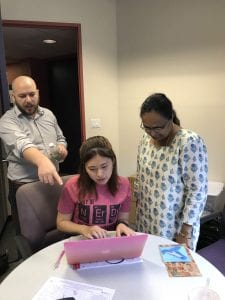
Overall, I am grateful that I was able to experience these different lab styles and this experience gave me an insight into what kind of lab environment I want to be in. The quality that I appreciate the most is to have independence. Being able to come up with ideas, having enough time to ponder upon it until I speak out, and being able to make detours in learning were approaches that suited me very much. I am currently interested in computational research because I am fascinated by the fact that a small laptop or computer can bring about so many benefits and insights.
Among the seminars I participated this week, the one on poster presentation was informative since I was constantly concerned about my poster. I especially appreciated the instructions on how to deal with several guests visiting at the same time. The difficult aspect of poster presentation is dealing with the flow of people. Some people may come when you are talking to another person. Learning how to include them all and be able to convey my research to everyone helped me be confident and comfortable during my presentation.
As I end my time at Rice, I will miss tacos and small talk in Houston. It is no secret that I grew a very big love for tacos. In fact, my mentor understood how much I liked tacos and gave me a mug with a picture of a taco as a souvenir. I will also miss Houston’s warm weather and welcoming people. I am hoping to come back to the U.S. for graduate school, but I still need to consider which university that I would like to enroll in.
Final Week in Lab and Final Poster Presentation
The final week in the lab was centered on making a good presentation. I received a lot of feedback from my professor and my mentor about the poster. I struggled a lot in the process of visualizing my work because the work I had done is codes and presenting the code itself is not appropriate. I had to decide on what to show that could help people understand. In addition, making a graph or plots via python was a new challenge, and in fact, it took me more than a day to create a small bar graph. I am very proud of myself that I managed to do so in the end.
Research Project Overview and Poster
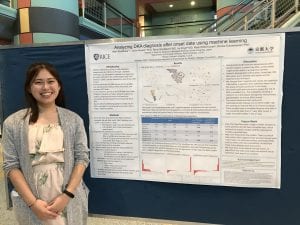
Doing a poster presentation ended up as a wonderful experience. I was very nervous and a little scared while I was preparing for it. So many concerns were in my head. “Would people be interested in my research?” “Would they understand with my explanation?” “How would my presentation proceed? What does the audience want to listen to after introduction?” “How briefly should I explain things?” “What if they ask questions that I have no idea about the answer?” For the last concern, my professor told me that it’s OK to say “I don’t know.” She also said that the genuine attitude would be appreciated. This made me feel relieved and I realized that the poster presentation is not only to inform others and answer their questions perfectly, but also to identify what you don’t understand and learn other perspectives. I am grateful that I was able to win the second place presentation prize, but I think this was all thanks to the privileged environment that I was put in.
Final Research Poster (PDF):“Analyzing DKA diagnosis after onset date using machine learning”
Recipient: 2nd Place Poster Presentation Award at Joint RCQM-Nakatani RIES Research Symposium
Host Lab at Rice University: Subramanian Lab
Host Professor: Prof. Devika Subramanian, Depts. of Computer Science and Electrical & Computer Engineering
Mentor: Justin Mower
Introduction: DKA is a complication of Type 1 diabetes that could cause death. Since preventing DKA is a crucial issue, we would like to help doctors assess whether a patient is likely to get DKA or not. We do this by quantitatively identifying the risk factors and building a predictive model.
Approach: Using data provided by the Texas Children’s Hospital, we trained several classifiers and build up models that identifies the patiest’s risk of getting DKA.
Result: Incorporating C-peptide test values, A1C test values and onset-age information to Logistic regression will create a well-performing model.
Discussion: It is possible to create a predictive model with the risk factors we identified. However, there is still a limitation in our models that needs to be improved.
Future research: We expect to improve the model’s performance by training the classifiers with more information. Also, it is worthwhile to use different algorithms to take time index into account.
Conclusion: We can quantitatively identify the risk factors and build models. This research is significant because this can potentially help doctors identify patients at risk of DKA.
Week 06: Last Week in the U.S.
I enjoyed the ghost tour on the night we arrived in Philadelphia for two main reasons. First, I was planning to do a ghost tour in San Antonio, but I ended up not doing it. Therefore, I am glad I had the opportunity to join this tour. One interesting thing is that these ghost tours are held in many cities. When I was planning my trip to San Antonio, I thought the ghost tour was unique to this city, but I realized that there are many cities that hold ghost tours in the U.S. Another reason is that I could enjoy the city at nighttime. I especially liked the parks with dim lights. This experience informed me that it is nice to go out at night instead of being comfortable in a hotel room when you travel, as long as you know it is safe.
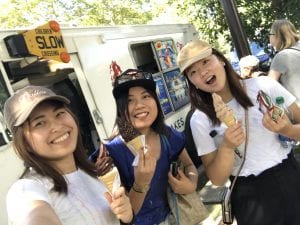
Philadelphia was overall a very fun city to be in. There was a very big difference between Houston and Philadelphia. Philadelphia seemed to have a lot more history and culture. I personally liked Philadelphia better than Houston, but I think this is mainly because it was easier to get around the city and there were so many things to see. I must keep in mind that when I have a chance to choose a city to live in, I should find a place that is culturally interesting since I enjoyed Philadelphia a lot.
After Philadelphia, we spent two days at Lehigh University. Lehigh University, indeed, seemed to be hidden in the mountains. Its appearance was somewhat mysterious, and in fact, it reminded me of McGill University in Canada. The architecture was very beautiful. The most memorable activities were the faculty lunch and the OraSure Company visit. In the faculty lunch, I was able to sit with Professor Susan Perry, a in the Department of Bioengineering. I asked whether she considers herself a scientist or an engineer. Her final answer was that she still considers that she is a scientist since she started her career as a biochemist. However, she told me that being exposed to the engineering side gave her a different mindset and ways to approach solving problems. I could not fully understand the difference that she mentioned, but I think there will come a day when I realize the difference.
Visiting OraSure and seeing the industrial side of the U.S. was very informative. I am personally satisfied that I was able to ask whether there is a disadvantage for an international student to apply for a job. They, of course, did not clearly say “yes” but I could sense that there is. That is, small companies will not be able to financially support them for visa related issues. It seems that international students should be aiming towards big companies if they want to find a job in the U.S.
- STEM OPT (Study in the States)
- What is the Difference Between OPT and CPT in the U.S. (Study USA)
- Rice Center for Career Development (CCD): Student Resources Page
- CCD Guide: International Students & the Job Search
- CCD Guide: International Students & the Job Search – A Student’s Perspective
- CCD Guide: Hiring Timeline

In Washington, D.C., the most unforgettable activity was by far the tour we had at the Library of Congress. Though I was not very familiar with the history of the U.S., it gave me an insight into what the U.S. has gone through. Especially, the dedication of Thomas Jefferson was impressive and his understanding of the value of knowledge and wisdom is something I wish that the Japanese politicians had. The aesthetic architecture of the building moved my heart from the beginning till the end, and to be honest, the U.S. having such an amazing architecture made me jealous.
I wish I had more time in Washington D.C. since the Smithsonian Museums are too big to appreciate in a few days. I visited the National Gallery of the Arts, the Air and Space Museum, and the Botanical Garden. One interesting thing that I noticed was that they had “eduroam” wifi. I had thought that “eduroam” is for universities around the world so finding this wifi made me realized that these museums play a role in educating the citizens.
Among all the cities we visited, I felt that Washington D.C. was the most comfortable. I think the well-organized infrastructure was somewhat relatable for Japanese people. It is a pity that the living cost there is expensive since it was a city I would have loved to live in.
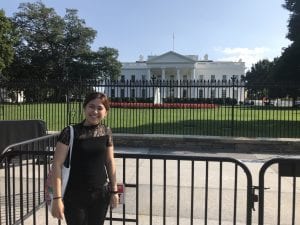
I had a huge culture shock when I came back from Canada after my 9-month exchange program. This prepared me well for this time, coming back from the U.S. What I like about Japan is the cheap and delicious food and well-organized infrastructure. I have been thinking a lot about my future and how I want to live. I have not come to a conclusion but I hope I can find a path that is satisfying and full of joy.
Final Report
By participating in this program, I have learned to strive for my goals outside my comfort zone. This program sets several concrete goals for the participants and also, since I have written some essays during the application, I had developed my own personal goals as well. Having these concrete objectives made my stay in the U.S. much more challenging and valuable. Conducting something outside of what you are normally used to requires a lot of courage and knowledge to support you through the uncertainties that you will face. For example, interviewing professors always made me nervous, but I tried to prepare myself as much as possible beforehand. Going through all the adventures in the U.S. definitely made me stronger and more motivated to challenge myself.
In the age of globalization, I think there is so little you can do within where you grew up in, but so much you can achieve once stepping out of your comfort zone. I think experiencing how work is done in the U.S. will inspire you how you want to form your lifestyle. There are aspects that match your personality and those you are not comfortable with. I have been contemplating a lot on how I want to balance the pros and cons of living in a certain country. Overall, I believe having a broader and deeper perspective will give you helpful insights when you have life-decisions to make.
What I would share about this experience with my family is that I think I have a relatively international background compared to an average Japanese person. This always let me think of going abroad in my career. As a person interested in doing research, going to the U.S. had always been a dream and a big option since I had heard so much positive reputation about America’s science field. I have told my parents numerous times that I will go out of this enclosed country and be successful worldwide. I still have this dream, but now I have learned to stop and rethink this reckless mindset. I did not deeply think about the struggle that lies after leaving my home country to build up my career. My goal does not lie in “leaving the country,” but sometimes I might get confused. What I learned is that I must be as ready as possible if I am going to challenge myself.
What I would share about this experience with my professors is that one of the most important things I learned is that I should be proud to be a part of the Japanese science society. I encounter a lot of negative news about the Japanese science society and this made me unsure about the future scientific research in Japan. Although I still believe there should be many improvements in Japan, no country has reached a perfect state, and of course, the U.S. community is seeking changes. What I learned is that there is a lot of respect towards Japanese scientists from all over the world and I need to acknowledge this. I hope to contribute to this positive reputation that Japan has.
What I would say to a future employer is that this program trained me to be independent and also work in a team. It is hard to balance, but I think this is an important aspect. My mentor was not too instructive, which meant I had to figure a lot of things on my own. In doing so, I had to be resilient and get the answers I needed but also flexible to ask for help. When asking for help, it was very important for me to clarify what I could and could not do. This skill is not something you gain only by studying alone and reading textbooks, but rather you must learn through “work” to complete a project. I would like to keep in mind that the way you study is not equivalent to how you work, and it is important to pay attention to the circumstances I am in.
Through this program I have thought a lot of my dreams; what I want to be and what I want to do. However, I hadn’t thought that much about my career and the lifestyle. I think these are very different. Career: what positions do I want to go through to achieve my dream? Lifestyle: How do I want to work to achieve my goal? What do I cherish beside work? These are some questions I learned to ask myself while looking at people, especially Japanese people, work in the U.S. I hope to contemplate on these topics on a daily basis.
Tips for Future Participants
Please read the weekly reports from the past participants, preferably someone who you can relate to (with the same background, same year etc). I highly recommend reading the final report and week 5 reports.
